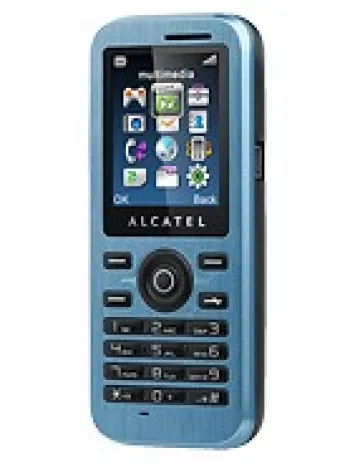
Alcatel OT-E159 Overview
The Alcatel OT-E159 represents a distinguished entry in the realm of feature phones from the mid-2000s. Announced in the first quarter of 2005, this device was designed to offer essential communication capabilities in a compact and efficient form factor. Although it has since been discontinued, the OT-E159 remains a testament to the mobile technology of its time. In this comprehensive report, we will explore the various aspects of this classic mobile phone, including its network capabilities, physical design, display features, memory options, sound configuration, connectivity options, additional features, and battery life.
Network Specifications
The Alcatel OT-E159 operates on GSM technology, which was ubiquitous in the mid-2000s. It is compatible with 2G GSM bands specifically at frequencies of 900 and 1800 MHz. While it lacks advanced features such as GPRS and EDGE for data connectivity, the primary focus of the OT-E159 was straightforward voice communication.
Launch Details
Officially announced in the first quarter of 2005, the Alcatel OT-E159 was positioned as an entry-level phone, perfect for users seeking basic telephony without the frills of modern smartphones. Despite its discontinuation, the phone remains a point of nostalgia for many who used it during its early years.
Body and Design
The OT-E159 boasts a compact body with dimensions of 83 x 43 x 22 mm, making it easy to carry and handle. Weighing merely 77 grams, it exemplifies the lightweight design that was common in an era focused on portability. The phone uses a mini-SIM, reflecting the standard of its time, and was available in three distinct colors: Thinking Black, Metallic Blue, and Lipstick Red.
Display Features
The device is equipped with a monochrome STN graphic display, presenting basic visuals at a resolution of 102 x 80 pixels. While the absence of a color screen may seem archaic today, it was sufficient for displaying essential information such as call details and menu options.
Memory Specifications
Internally, the Alcatel OT-E159 does not support expandable memory, and it does not feature a card slot. However, it provides adequate space for storing up to 250 phonebook entries. Call logs are efficiently managed with the ability to save records of the last 10 dialed, received, and missed calls.
Sound Configuration
Sound alerts on the OT-E159 include vibration and polyphonic ringtones, accommodating up to 16 tones. Notably, the device does not possess a loudspeaker or a 3.5mm audio jack, which aligns with its focus on basic functionality without multimedia capabilities.
Connectivity Options
As a feature phone intended for basic use, the OT-E159 does not support advanced connectivity options such as WLAN, Bluetooth, or USB connectivity. It lacks features like location services and lacks a built-in radio, further emphasizing its role as a simple communication tool.
Additional Features
The OT-E159 caters to basic communication needs with SMS messaging capabilities. While it lacks an internet browser and Java support, the phone provides simple entertainment through pre-installed games. The absence of sensors marks its position as a straightforward mobile device.
Battery Life
The Alcatel OT-E159 is powered by a removable Li-Ion 650 mAh battery. It offers an impressive standby time of up to 275 hours, with talk time lasting up to 10 hours and 30 minutes. Such battery efficiency was appealing during an era when mobile devices prioritized longevity over frequent recharging.
Conclusion
In conclusion, the Alcatel OT-E159 is emblematic of mid-2000s mobile technology, characterized by its basic functionality and durable design. While lacking modern smartphone features, it fulfilled its purpose as a reliable communication device. Its discontinuation does not overshadow the role it played in connecting users and its lasting legacy in mobile phone history.
Main Features of Alcatel OT-E159
- Compact and lightweight design with dimensions of 83 x 43 x 22 mm and weight of 77 g.
- Supports GSM technology with 2G bands GSM 900/1800.
- Offers a monochrome graphics STN display with a resolution of 102 x 80 pixels.
- Can store up to 250 entries in the phonebook.
- Keeps records of the last 10 dialed, received, and missed calls.
- Equipped with a removable Li-Ion 650 mAh battery, providing up to 275 hours of standby time and up to 10 hours 30 minutes of talk time.
- Available in three colors: Thinking Black, Metallic Blue, and Lipstick Red.
Disadvantages of Alcatel OT-E159
- No GPRS or EDGE support, limiting internet connectivity options.
- Discontinued status, meaning it's no longer supported or available for purchase new.
- Monochrome graphics display with low resolution (102 x 80 pixels).
- No expandable memory due to the absence of a card slot.
- Lacks a camera, which is a common feature in modern phones.
- No loudspeaker or 3.5mm headphone jack for audio output.
- Limited communication options: no WLAN, Bluetooth, GPS, radio, or USB connectivity.
- No web browser support for internet access.
- Limited to SMS for messaging, with no support for multimedia messaging (MMS).
- No Java support for running additional applications.

View Also
More Phones
All Rights Reserved +14268 Phones © Mobilawy 2025

























